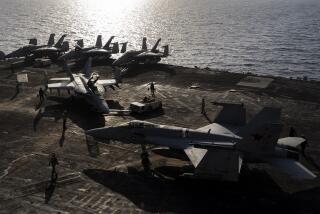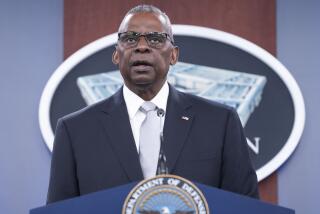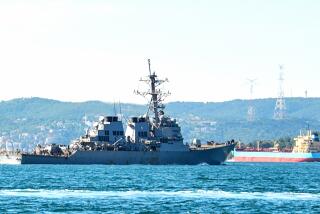Gulf Force in ‘Untenable’ Position: Byrd : Says U.S. Policy in Region Needs to Be Reassessed
WASHINGTON — U.S. ships in the Persian Gulf are “in an untenable position” and President Reagan’s policy in the region needs to be reassessed following the Navy’s downing of an Iranian airliner with 290 people on board, Senate Majority Leader Robert C. Byrd said today.
Byrd and other members of Congress attending a series of closed-door Pentagon briefings Wednesday appeared convinced that the captain of the U.S. warship Vincennes acted responsibly in launching the missile that destroyed an Iranian airliner with 290 people on board.
In a Senate floor speech today, Byrd said he is not advocating a U.S. withdrawal from the gulf, where American ships have operated for 40 years. But he added:
“It’s one thing to maintain our presence there. But it’s another thing to go day to day in a volatile environment. . . . They are placed in an untenable position.”
Seeks ‘New Assessment’
He said he had asked Defense Secretary Frank C. Carlucci on Wednesday to “give us a new assessment” of threats to the Navy in the shallow, crowded gulf. He said the new review is needed “so we won’t be going from day to day with the likelihood of this occurring again.”
CIA Director William H. Webster, meanwhile, said after a closed meeting with the House Foreign Affairs Committee that the United States was “of course” prepared for any Iranian reprisals.
Declining to be specific, he said:
“We already have in place a very effective counterintelligence strategy around the world, and it’s being utilized. The one thing you don’t do in situations like this is panic and run to put the sand trucks up in place.
“Our government has procedures in place to protect our citizens and our officials who would be likely targets. And they are being utilized.”
‘Error of Misidentification’
House Speaker Jim Wright, meanwhile, called Sunday’s incident “a very straightforward error of misidentification” but said the Iranian government “must assume some serious responsibility for this kind of an error” because of the attacks by its gunboats on the Vincennes just before the A-300 Airbus was shot down.
Lawmakers said several factors--the skirmish with Iranian patrol boats, electronic data that made the approaching plane appear to be military and intelligence information that indicated heightened chance of a major attack--combined to justify the decision of the captain of the Vincennes to fire two missiles at an unseen target.
“The ship’s captain had every reason in the world to feel threatened,” Rep. Ike Skelton (D-Mo.), a member of the House Armed Services Committee, said after one briefing Wednesday. “I don’t think he had any choice but to shoot it down.”
More to Read
Sign up for Essential California
The most important California stories and recommendations in your inbox every morning.
You may occasionally receive promotional content from the Los Angeles Times.










